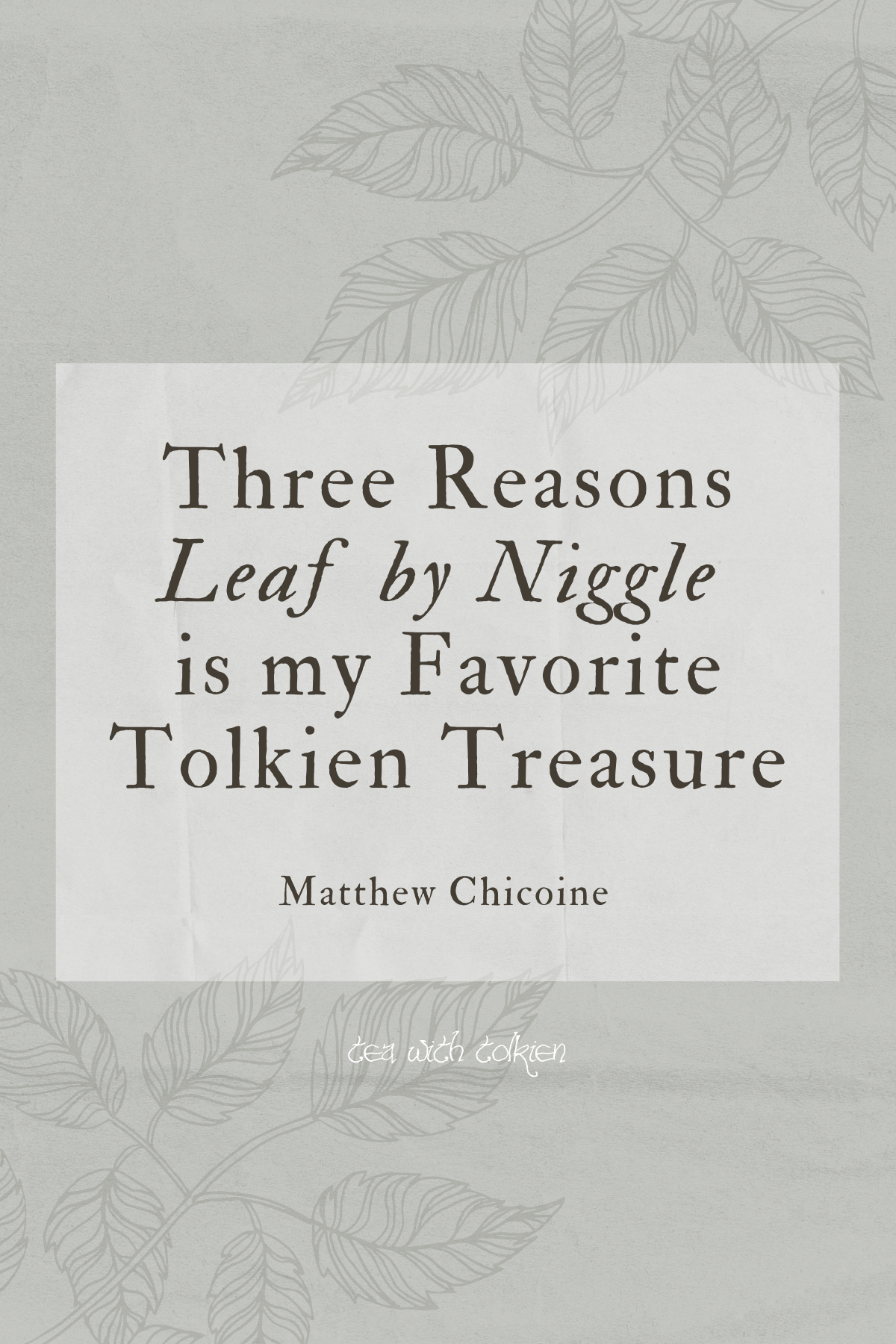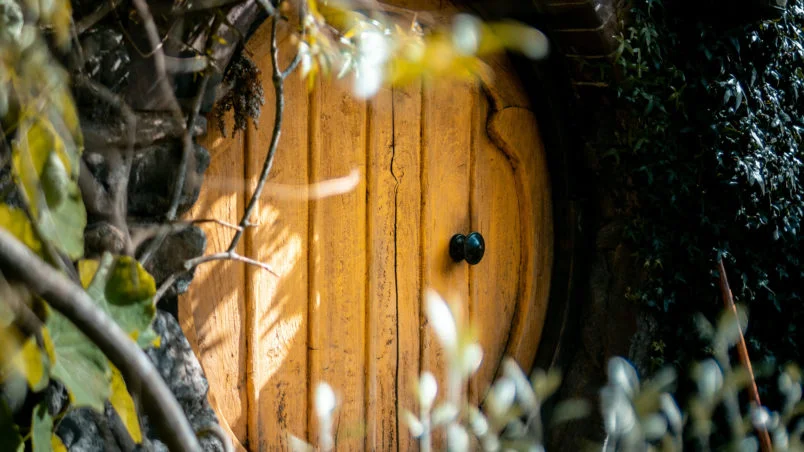Guest Post: 3 Reasons Leaf by Niggle is my Favorite Tolkien Treasure
As a Middle-earth aficionado, I have read J.R.R. Tolkien’s The Hobbit, Lord of the Rings, and The Silmarillion. Currently, I am navigating the land of Beleriand as I am reading The Children of Húrin. While these books are creative and profound, my personal favorite Tolkien work [so far this may be subject to change!] does not take place in a mythic land or through the medium of an epic adventure tale. Instead, a short story published in 1945 wins my personal Pulitzer. Leaf by Niggle does not follow hobbits, elves, dwarves, or contain any sinister evil such as Sauron or Morgoth. Instead, the plots details of a simple painter’s journey in the afterlife.
The short story begins by depicting Niggle, an artist, living in a society with little esteem for art. Niggle's neighbor Parish, who is lame and has an ill wife, continually interrupts his work. Although Niggle views such disruptions as annoying, he still helps his neighbor due to his politeness.
Niggle is forced to take a trip that he is not ready for and spends time at a hospital. Daily work as a gardener is the task that he is entrusted with during his time at the health institution. Throughout this process, the reader hears two unseen voices discuss the progress of Niggle.
It is determined that the artist made advancements and is sent to a new country—the Land of the Tree and Forest of his great painting. Niggle becomes re-united with Parish and together they work the land. Their work brings beauty to the Tree and the Forest. Finally, Niggle bids farewell to Parish as he continues his journey with the shepherd to learn more about the sheep and journey toward the high pastures in the Mountains.
Clearly Catholic
The main reason I enjoy Leaf by Niggle is due to the clear catholicity contained within the characters, plot, and symbols. Niggle represents everyman—humanity as an individual and as a collective. When I looked up the word niggle in the thesaurus, I learned that the name has synonyms which included: annoy, bother, discomfort, and anxiety. According to Lumen Gentium [Dogmatic Constitution of the Church] 7, “On earth, still as pilgrims in a strange land, tracing in trial and in oppression the paths He trod, we are made one with His sufferings like the body is one with the Head, suffering with Him, that with Him we may be glorified.” Niggle also suffered various disturbances of his artwork while he was on a pilgrim journey.
Another example of how Tolkien clearly infused Catholic thought into his short story is the hospital being an allegory for the cleansing process of purgatory. Next, the Voices represent the judgment and mercy of God. The English writer conveys the balanced Catholic approach to Divine Mercy and Judgment through the dialogue between the voices on Niggle’s progress:
"Now the Niggle case," said a Voice, a severe voice, more severe than the doctor's.
"What was the matter with him?" said a Second Voice, a voice that you might have called gentle, though it was not soft-it was a voice of authority, and sounded at once hopeful and sad. "What was the matter with Niggle? His heart was in the right place."
"Yes, but it did not function properly," said the First Voice. "And his head was not screwed on tight enough: he hardly ever thought at all. Look at the time he wasted, not even amusing himself! He never got ready for his journey. He was moderately well-off, and yet he arrived here almost destitute, and had to be put in the paupers' wing. A bad case, I am afraid. I think he should stay some time yet."
"It would not do him any harm, perhaps," said the Second Voice. "But, of course, he is only a little man. He was never meant to be anything very much; and he was never very strong. Let us look at the Records. Yes. There are some favourable points, you know."
"Perhaps," said the First Voice; "but very few that will really bear examination."
"Well," said the Second Voice, "there are these. He was a painter by nature. In a minor way, of course; still, a Leaf by Niggle has a charm of its own. He took a great deal of pains with leaves, just for their own sake. But he never thought that that made him important. There is no note in the Records of his pretending, even to himself, that it excused his neglect of things ordered by the law."
"Then he should not have neglected so many," said the First Voice.
"All the same, he did answer a good many Calls."
I am Niggle
Probably the biggest takeaway I received from Leaf by Niggle this that the titular character mirrors traits found within myself. While Niggle engrossed himself in artwork, I often find myself absorbed in my hobbies of reading and writing. Daily disturbances—such as assisting neighbors in need—annoy Niggle, but he ultimately does the right thing, just not always out of love. In a similar fashion, I struggle to carry out my familial and employee duties without ever lamenting or finding these tasks bothersome. At the end of the day, I will complete my duty because it is right and moral. What I sometimes lack is serving my family and co-workers with love all the time!
Tolkien’s ability to depict the rawness and realness of Niggle urged me to re-read this short story almost immediately upon completing it the first time. As an idealist, I am often color-blind to the real-life situations and toils of daily living. Leaf by Niggle provides clarity into how God judges a person’s life. I am hopeful, yet realistic about God’s mercy and realize I have a purgative road ahead of me in this life [and likely the next life!].
Purgatory is a Real Process
According to the Catechism of the Catholic Church number 1030, “All who die in God's grace and friendship, but still imperfectly purified, are indeed assured of their eternal salvation; but after death they undergo purification, so as to achieve the holiness necessary to enter the joy of heaven.” Niggle’s trip to the hospital and the Land of the Tree and Forest represent the Christian doctrine of purgatory—a state of existence whereby souls are purified. Purgatory is an ephemeral existence, it is not permanent. It is a stage toward Heaven. However, the process of purgation is not ethereal, it involves a REAL PROCESS of perfection.
Tolkien utilizes allegory to capture this truth. He details concrete examples to describe the purgative experience. Death is the doorway that leads mankind toward purgation [this is assuming they led an imperfect life, but ultimately choose to follow God!]. In Leaf by Niggle, Tolkien represents Death via two character’s the Inspector of Homes and the Driver—brings Niggle to the hospital [i.e. Purgatory]. Listen to the conversation between Death and Niggle:
“Next day he felt a good deal better. He climbed the ladder, and began to paint. He had just begun to get into it again, when there came a knock on the door.
"Damn!" said Niggle. But he might just as well have said "Come in!" politely, for the door opened all the same. This time a very tall man came in, a total stranger.
"This is a private studio," said Niggle. "I am busy. Go away!"
"I am an Inspector of Houses," said the man, holding up his appointment-card, so that Niggle on his ladder could see it. "Oh!" he said.
"Your neighbour's house is not satisfactory at all," said the Inspector.
"I know," said Niggle. "I took a note to the builders a long time ago, but they have never come. Then I have been ill."
"I see," said the Inspector. "But you are not ill now."
"But I'm not a builder. Parish ought to make a complaint to the Town Council, and get help from the Emergency Service."
"They are busy with worse damage than any up here," said the Inspector. "There has been a flood in the valley, and many families are homeless. You should have helped your neighbour to make temporary repairs and prevent the damage from getting more costly to mend than necessary. That is the law. There is plenty of material here: canvas, wood, waterproof paint."
"Where?" asked Niggle indignantly.
"There!" said the Inspector, pointing to the picture.
"My picture!" exclaimed Niggle.
"I dare say it is," said the Inspector. "But houses come first. That is the law."
St. Paul tells us in 1 Thessalonians 5:2, “For you yourselves know very well that the day of the Lord will come like a thief at night.” We do not know the hour of our death. Just how Niggle failed to be fully prepared to meet death, we might be surprised at the end of this earthly existence. Thankfully, due to the mercy of God, a process/period of purgation exists. Any lover of Tolkien and Christian allegory will find enjoyment while reading Leaf by Niggle.







